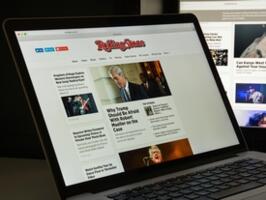Voters More Confident U.S. Will Remain Most Powerful Nation
Voters have more faith today that the United States will remain the world’s top superpower.

Voters have more faith today that the United States will remain the world’s top superpower.

If a U.S. president calls an adversary "Rocket Man ... on a mission to suicide," and warns his nation may be "totally destroyed," other ideas in his speech will tend to get lost.

The founder of Rolling Stone announced this week that he plans to sell the iconic music and counterculture magazine. Americans have mixed reviews of Rolling Stone, though they’re not reading magazines much these days, anyway.

St. Louis has erupted in protests following the acquittal of a white former St. Louis police officer who fatally shot a black man in 2011. Nearly half of Americans think the unrest there is fueled by criminals seizing an opportunity.

In the midst of a grueling campaign for the Republican nomination for U.S. Senate, Alabama’s political sweet tea has acquired a distinctly sour taste. Appointed incumbent Sen. Luther Strange (R) finds himself in a vulnerable position against former Alabama Supreme Court Chief Justice Roy Moore (R) in the party’s primary runoff election, which will take place on Tuesday (Sept. 26).

While most voters agree that the United States is overpaying for its involvement in the United Nations, a majority of voters still have a positive view of the UN and think the United States should continue to be a part of it.

A high school in California is facing controversy after addressing what they considered an intolerant “USA” chant at sporting events. While nearly half of voters don’t think the government is sensitive enough to concerns of racial, ethnic, religious and social minorities in this country, they don’t see this chant as an intolerant expression.

Voters still think the United States is overpaying for its involvement in the United Nations but are feeling a little more charitable than they were a year ago.

The numbers don't lie. Across the entertainment industry, viewers and fans are tuning out. It's no coincidence ratings are cratering as unhinged celebrities crank up their anti-Trump and anti-American antics.

America is back.
Turns out that beleaguered and forgotten Americans aren’t the only ones in dire need of a strong dose of straight talk from America’s president.

After losing a major stronghold in Iraq, the Islamic State group (ISIS) may be close to defeat on the ground there, and voters here think the United States definitely has the edge on its radical rival of recent years.

Michelle Freenor's business almost failed before it began.

As President Donald Trump mulls his options on the Iran nuclear deal, most voters continue to view Iran as an enemy but have mixed feelings on how Trump has dealt with the Middle Eastern nation.

Isn’t it funny how all the great political experts who never met a Trump supporter and never thought President Trump could win the White House are suddenly the greatest experts on how upset Mr. Trump’s voters are with all the president’s wheeling and dealing with dirty Democrats?

"The Barbarian cannot make ... he can befog and destroy but ... he cannot sustain; and of every Barbarian in the decline or peril of every civilization exactly that has been true."

A new study from Columbia University finds suicide attempt rates among American Adults on the rise, and more than half today say they’ve lost someone to suicide.

Thirty-one percent (31%) of Likely U.S. Voters now think the country is heading in the right direction, according to a new Rasmussen Reports national telephone and online survey for the week ending September 14.

Voters are following the actions of the so-called “antifa” protesters and aren’t impressed with what they see.

Financial markets and most media pundits are missing the new writing on the wall. For a variety of reasons surrounding shrewd moves by President Trump, the chances for significant tax cuts in the next 10 weeks have risen sharply.

Bernie Sanders and 16 Democratic senators have presented a new single-payer health care plan to Congress.